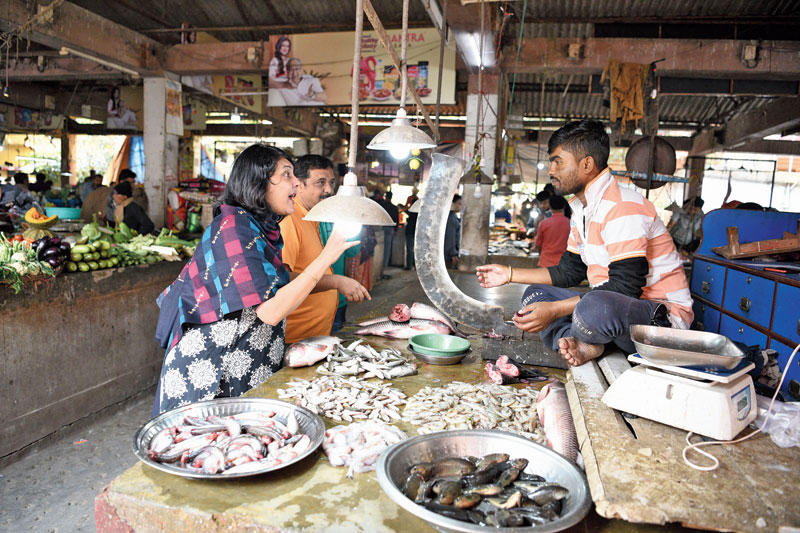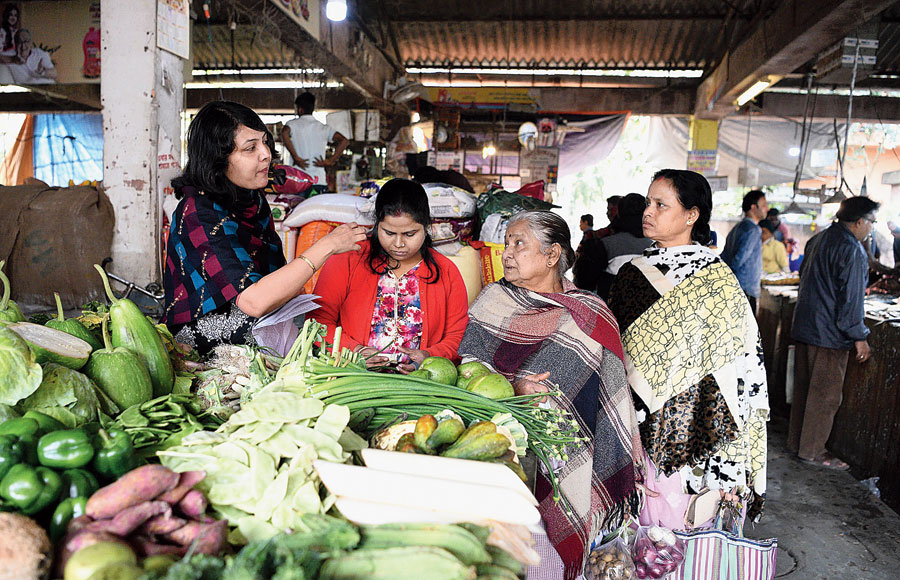Sunday-morning shoppers at a Patuli market were greeted by a group of people distributing Bengali pamphlets to tell the “truth behind CAA-NPR-NRC” in between buying fish and vegetables.
The campaigners, residents of the area who have come together under the banner of the Humans of Patuli, reached the CMDA market in Block D of Patuli, a minute’s drive from the EM Bypass, by 9am and took turns to get into a rickshaw and speak on the “perils” of the citizenship drive on mic all morning.
“The BJP is lying when it says Hindus won’t be affected by the NRC. Majority of the people excluded from the NRC in Assam are Hindus. A woman who campaigned for the CAA and NRC later found herself excluded from the list,” Kasturi Basu, one of the organisers of the drive and a documentary filmmaker said on the mic.
The organisers said they wanted to take the protests to every home and neighbourhood to help people “understand the government’s ploy to divide people and divert attention from real bread-and-butter issues such as the faltering economy”.
Some volunteers distributed pamphlets on the road and the rest went inside the market. “This campaign is not under the banner of any political party. This is our campaign, yours and mine, because the CAA-NPR-NRC threatens us, you and me,” Pubali Rana, one of the organisers, told a middle-aged man as he bought vegetables.

One of the campaigners talks about the new citizenship matrix on the loudspeaker
Patuli is home to many migrants from across the border.
Another volunteer explained to an elderly woman how Hindu immigrants from Bangladesh would also be “in trouble” because of the citizenship drive. “Muslims excluded from the NRC will be declared infiltrators. Non-Muslims not on the list but who came to India before 2015 will be considered refugees and eligible for citizenship through the CAA,” the volunteer said.
“For non-Muslims to avail themselves of the opportunity, they have to declare in writing that they are not Indian citizens. Both my parents came from Bangladesh. Will they be ready to surrender their Indian voter cards, Aadhaar cards, passports and other documents and declare themselves as Bangladeshi refugees? Please think.”
Not everyone was convinced. “I have to go home and cook. I don’t have time for a discussion. But you are trying to create panic,” a woman told a volunteer, who replied: “Please read the pamphlet in full. There are phone numbers at the bottom. Please call us if there is anything that you don’t understand or disagree with.”

Another campaigner explains it to a fish seller
Parimal Halder, who sells fruits, was reading the pamphlet. “I don’t understand CAA. What I know is that the economy is in a bad shape (bajaar khub kharap). My daily sales would earlier go up to Rs 3,000 a day and around Rs 4,000 on Sundays until three years ago. Now, it has come down to Rs 1,500 a day,” Halder said.
The campaign’s next stop was the Patuli floating market .
Nisha Biswas, 65, a human rights activist and former scientist at the Central Glass and Ceramic Research Institute in Jadavpur, spoke about Shafiq Mian, who used to be the manager of her father’s factory in Bareilly, Uttar Pradesh, around six decades ago.
“He came to our house often and drank tea with everyone else. But there was a separate cup for him. One day, my mother got confused and gave him another cup. He drank the tea and went away. When my grandmother came to know of this, she created a scene. My mother suddenly took Shafiq Mian’s usual cup and flung it on the ground, smashing it to bits,” Biswas recalled. “I now realise what my mother broke 60 years ago has been rebuilt by us. We have failed her generation.”

